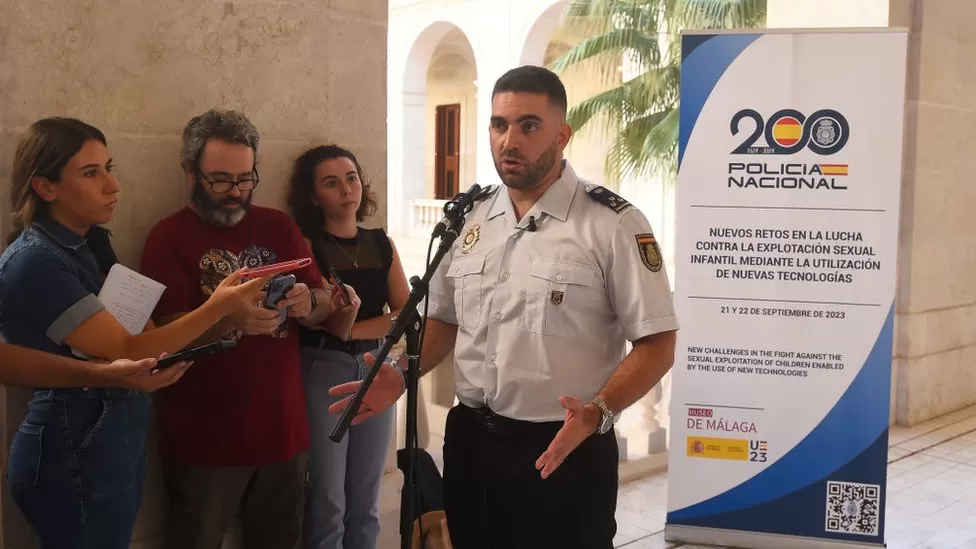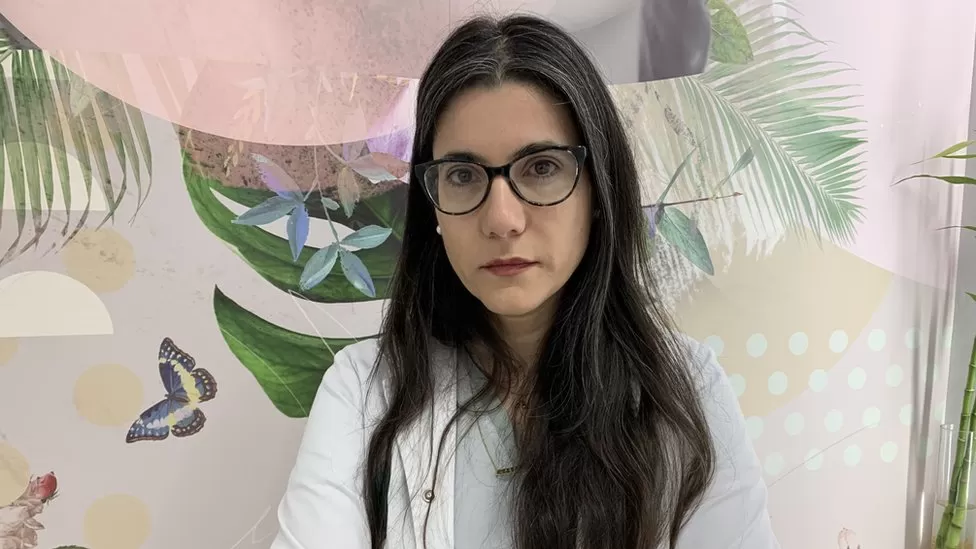A sleepy town in southern Spain is in shock after it emerged that AI-generated naked images of young local girls had been circulating on social media without their knowledge.
The pictures were created using photos of the targeted girls fully clothed, many of them taken from their own social media accounts.
These were then processed by an application that generates an imagined image of the person without clothes on.
So far more than 20 girls, aged between 11 and 17, have come forward as victims of the app’s use in or near Almendralejo, in the south-western province of Badajoz.
“One day my daughter came out of school and she said ‘Mum there are photos circulating of me topless’,” says María Blanco Rayo, the mother of a 14-year-old.
“I asked her if she had taken any photos of herself nude, and she said, ‘No, Mum, these are fake photos of girls that are being created a lot right now and there are other girls in my class that this has happened to as well.’”
She says the parents of 28 girls affected have formed a support group in the town.
Spanish authorities have launched an investigation into the imagesPolice are now investigating and according to reports, at least 11 local boys have been identified as having involvement in either the creation of the images or their circulation via the WhatsApp and Telegram apps.
Investigators are also looking into the claim that an attempt was made to extort one of the girls by using a fake image of her.
The impact the images’ circulation has had on the girls affected varies. Ms Blanco Rayo says her daughter is bearing up well, but that some girls “won’t even leave their house”.
Almendralejo is a picturesque town with a population of just over 30,000 which is known for its production of olives and red wine. But it’s not used to the sudden attention this case has brought, making the town national headline news.
That’s in great part because of the efforts of one of the girls’ mothers, Miriam Al Adib. She’s a gynaecologist who has used her already prominent social media profile to place this issue at the centre of Spanish public debate.
“I wanted to give the message: it’s not your fault,” Miriam Al Adib saysAlthough many of the AI images are believed to have been created over the summer, the case only came to light in recent days after Dr Adib posted a video reassuring the girls affected and their parents.
“We didn’t know how many children had the images, if they had been uploaded to pornographic sites - we had all those fears,” she says.
“When you are the victim of a crime, if you are robbed, for example, you file a complaint and you don’t hide because the other person has caused you harm. But with crimes of a sexual nature the victim often feels shame and hides and feels responsible. So I wanted to give that message: it’s not your fault.”
The suspects in the case are aged between 12 and 14. Spanish law does not specifically cover the generation of images of a sexual nature when it involves adults, although the creation of such material using minors could be deemed child pornography.
Another possible charge would be for breaching privacy laws. In Spain, minors can only face criminal charges from the age of 14 upwards.
The case has caused concern even for local people who are not involved.
“Those of us who have kids are very worried,” says Gema Lorenzo, a local woman who has a son, aged 16, and a daughter, aged 12.
“You’re worried about two things: if you have a son you worry he might have done something like this; and if you have a daughter, you’re even more worried, because it’s an act of violence.”
Francisco Javier Guerra, a local painter and decorator, says the parents of the boys involved are to blame. “They should have done something before, like take their phones away, or install an application that tells them what their children are doing with their phone.”
This is not the first time such a case has become news in Spain. Earlier this year, AI-generated topless images of the singer Rosalía were posted on social media.
“Women from different parts of the world have written to me explaining that this has happened to them and they don’t know what to do,” says Miriam Al Adib.
“Right now this is happening across the world. The only difference is that in Almendralejo we have made a fuss about it.”
The concern is that apps such as those used in Almendralejo are becoming increasingly commonplace.
Javier Izquierdo, head of children’s protection in the national police’s cyber-crime unit, told Spanish media that these kinds of crimes are no longer confined “to the guy who downloads child porn from the Dark Web or from some hidden internet forum”.
He added: “That obviously is still going on, but now the new challenges we are facing are the access that minors have at such an early age [to such technology], such as in this case.”





But the overall impact of not being able to trust any image will not be positive. We already have widespread distrust of everything in the media that leads to people forming cults around their beliefs and strong personalities that are immune to facts. That will only get worse as photos and videos can no longer be trusted as evidence of anything real.